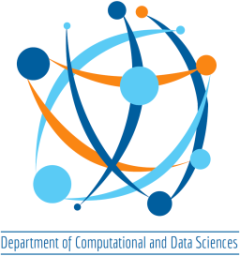We welcome you to CDS-KIAC talk on 04th August 2025 (Monday).
The details are as below:
Speaker: Prof. Sanghamitra Neogi, Associate Professor, USA
Title: “Exploring Materials Physics with Shallow, Reinforcement and Generative Machine Learning Models”
Date and Time: August 04, 2025: 4:00 PM
Abstract: Machine learning has become a powerful tool for accelerating materials discovery and uncovering complex structure–property relationships. In this talk, I will present an overview of how my research leverages shallow models, reinforcement learning, and generative models to address key challenges in materials physics. My research group at the University of Colorado Boulder designs analytical and computational frameworks to investigate phononic, thermal, electronic, thermoelectric, and quantum properties across a broad spectrum of materials. Guided by an atom-to-device research philosophy, we connect atomic-scale physics to the emergent behavior of complex nanostructures and devices and establish direct links between simulations and experiments. We employ first-principles electronic-structure methods, atomistic molecular-dynamics simulations, and finite-element analysis, and we increasingly rely on machine learning models to study material systems that remain inaccessible to conventional computational approaches due to their high cost and inherent limitations. I will showcase examples from my research, including predictions of electronic properties of layered semiconductor materials, mapping composition–property spaces of complex multi-element alloys, and elucidating how microstructural features influence thermal properties. I will discuss how shallow models provide key physics insights into structure–property relationships in cases with limited training data. Using reinforcement learning, we map the interdependent space of material compositions, atomic arrangements, and resulting properties and develop approaches that enable efficient exploration and targeted materials discovery. Generative models allow us to build multiphysics models and perform inverse design of microstructures with targeted thermal properties. By integrating physical constraints with machine learning, we aim to enhance model fidelity, interpretability, and generalization, ultimately accelerating the design of materials for electronics, energy, extreme-environment, and quantum technologies.
Bio of Speaker: Sanghamitra Neogi is an Associate Professor at the Ann and H.J. Smead Department of Aerospace Engineering Sciences at the University of Colorado Boulder. Additionally, she is a Program Faculty at the Materials Science and Engineering Program at the University of Colorado Boulder. Prior to joining CU, she received her B.Sc. and M.Sc. in Physics from Jadavpur University, Kolkata, and Indian Institute of Technology, Kanpur, India, respectively. She received her Ph.D. in theoretical condensed matter physics from the Pennsylvania State University and was a postdoctoral research associate at the Max Planck Institute for Polymer Research, Mainz, Germany. Her group, the CUANTAM (CU Aerospace Nanoscale Transport Modelling) Lab in the Aerospace Engineering Department, develops computational modeling approaches to investigate the physics of materials in engineering devices functioning in extreme environments. Her research was featured in the IEEE Spectrum feature, “Physicists Teach AI to Simulate Atomic Clusters: Physics-informed machine learning might help verify microchips,” (Jul 2021) and received mention in the Journal of Physics D: Applied Physics article “The 2022 applied physics by pioneering women: a roadmap.” She was an Associate Editor for the European Physical Journal B: Condensed Matter and Complex Systems. She is a 2025 recipient of the VAIBHAV (Vaishvik Bharatiya Vaigyanik) Fellowship, awarded by the Department of Science & Technology, Government of India.
Host Faculty: Prof. Venkatesh Babu
ALL ARE WELCOME



